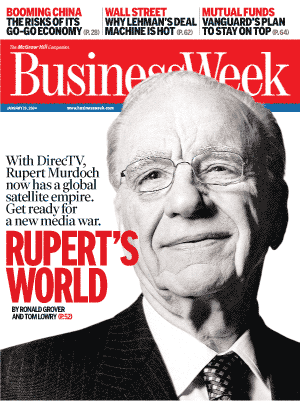Topic: Conglomeration & Control Instructor: Jack
Lule On this page are the assignments for Monday, June 7. DEADLINES: You should have Monday's assignments completed by Thursday, June 10, at 7 p.m.
WEEK FOUR, MONDAY: We now look at international communication from another perspective: conglomerations and mergers. If you're like me, global economics is not the most . . . exciting topic. But global conglomerations can actually be very intriguing. And there is probably no more important topic in international communication. A handful of media companies and moguls -- "Lords of the Global Village" -- own and control a huge percentage of the world's media. The percentage rises regularly. We are heading toward a future where, quite possibly, less than a dozen people or companies will own most of the media of the world. It's one of the most important and disturbing aspects of international communication. Yet very few people know much about it. Where would they get the information? From the media owned and controlled by these very moguls? Not likely. This week we'll think about the implications of the
growing global media monopoly. ASSIGNMENTS 1) Our first reading is a small excerpt from a classic. The author is Ben Bagdikian, a journalist with a wonderfully varied career. As a Washington Post reporter, he worked with the Pentagon Papers, a hugely important story from the Nixon era. Bagdikian eventually left journalism for the university life. He has done important research in media economics. His book, The Media Monopoly, is regularly revised and reprinted. In June 1989, Bagdikian published a long cover story for the progressive weekly, The Nation. The story, "The Lords of the Global Village," was a detailed report of media conglomeration on a global scale. Though its details are dated, the issues and themes are timeless and will give us a great introduction to the issues. I have put a small excerpt at my site for you to read. 2) As I noted, the Bagdikian article was written in 1989. It predicts the trends well but we will need to update the information. To update the Bagdikian piece, I will send you to work by the scholars Robert McChesney and Mark Crispin Miller. McChesney and Miller both have written extensively on the continuing conglomeration of international news media. A McChesney article, "Oligopoly: The Big Media Game Has Fewer and Fewer Players," is from the Progressive magazine. It provides information and also offers some possible solutions to the huge problem of conglomeration. The Progressive link should work but just in case, here's a copy of the article at my site. 3) The Miller article, "What's Wrong With This Picture," is a bit more recent. The article was originally published in The Nation. Here's a copy if the link doesn't work. He writes about The Big Ten conglomerates who control much of the world's media. 4) After reading about this major issue, I would like to hear your thoughts on the Bagdikian excerpt and the McChesney and Miller articles. Send me an email message, jack.lule@lehigh.edu, discussing important points and trends and McChesney's solutions. 5) For our conference, I want us to consider the case of Rupert Murdoch has emerged as one of the dominant owners of media in the world. He is truly one of the world's media moguls. I want you to read "Rupert's World," a Business Week cover story on Murdoch. Here also is a map of Rupert's world. I would like you to read over these items and, after that, I would like to take up these issues in our conference. How do you feel about global media conglomeration? Is it good? Bad? Inevitable? Try to take up points by McChesney and other participants from the readings. Who makes the most sense to you? Listen to the thoughts of your classmates. What do you think? See you in conference. Please let me know if you
have questions: jack.lule@lehigh.edu.
return to J/IR 246 International Communication |
